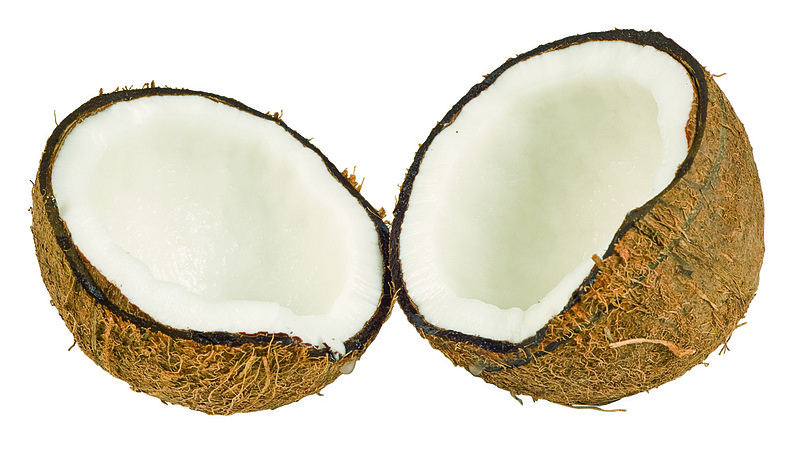There is a lot of articles talking about the potential health benefits of coconut oil. For some reason people just love coconut oil, and they like to use words such as "healthy," "lifesaving" and "magic food" to describe it. However, there are a lot of myths and incredible conclusions about coconut oil, so consumers have to be cautious when they take recommendations from internet, magazines or TV.
As coconut oil continues to gain popularity, many of my patients and clients ask me about it. In order to help more people to understand about the truth about coconut oil, I have decided to write an article to talk about the most popular myths and the science behind them.
Myth No. 1: Coconut oil is good for the heart.
The facts: Coconut has been an important component of the diet of Kerala population for decades. Some local articles indicated that coconut oil is a major contributor to the rise in the incidence of coronary artery disease (CAD) among the Kerala population have made people shift to alternative cooking oils like sunflower oil.
In a study from India, researchers fed 70 normal, healthy people and 70 patients with diabetes but without previously diagnosed CAD diets who got 13-20 percent of their calories from either coconut oil or sunflower oil. After six years, though lipid profile parameters and oxidative stress were high in diabetic subjects compared to controls, no pronounced changes for these parameters were observed between the subgroups (coconut oil vs. sunflower oil).
Another group of researchers from Malaysia (a major coconut-oil exporter) did a similar study on young healthy people, but they compared coconut oil with olive oil. After five weeks, low-density lipoprotein (LDL) was 8 percent higher in the coconut oil diet. High-density lipoprotein (HDL) was 7 percent higher. Raising LDL cholesterol increases the risk of heart disease. Therefore, even though coconut oil may not cause increased risk of CAD, it also may not be as healthy for the heart as an oil like olive or canola, which lowers LDL and has effect on HDL as well.
Myth No. 2: Coconut oil can help you lose weight by speeding up metabolism.
The facts: In 2009, one master's student in Brazil conducted a study to evaluate the effects of dietary coconut oil on the biochemical and anthropometric profiles of women with abdominal obesity. The study provided 40 obese women either coconut oil or soybean oil and asked them to cook with 2 tablespoons of the oil every day. After three months, the group given coconut oil did not weigh any less, but the average waist size dropped from 39 to 38.5 inches, which wasn't statistically significant. However, some commercials highlighted the result of this study to help sell their coconut oil products.
The rationale behind the consumption of coconut oil with weight loss is that some researches found medium-chain triglycerides (MCTs) can raise the metabolic rate slightly to help weight loss. However, these studies are based on the oil made entirely of MCTs. Coconut oil only contains about 60 percent MCTs. There is no solid evidence to prove that coconut oil could help people lose a significant amount of weight by itself.
Myth No. 3: Coconut oil fights bacteria and prevents infections.
The facts: There never has been a well-designed study in humans to prove that coconut oil could fight bacteria and prevent infections. In some animal studies, they flunked.
In conclusion, all natural foods have potential health benefits for the majority of people, but only consuming one single "healthy food" will not improve people's overall health. Healthy, balanced meals with adequate physical exercise are the only key for a healthy life.
Lu Anderson is a clinical dietitian with a master's degree in medical nutrition from Saint Louis University. She works as a clinical dietitian at St. Mary's Hospital in Jefferson City and Audrain, including both inpatient and outpatient services to help people with a variety of illnesses learn how to use food to improve their symptoms and quality of life.
OLIVE OIL & HERB MASHED POTATOES
In this healthy mashed potato recipe, we flavor the mashed potatoes with an herb-infused olive oil. These green-specked mashed potatoes taste great with pan-seared pork chops or chicken.
8 servings, about 3/4 cup each
3 pounds Yukon Gold potatoes (about 12 medium)
1 tablespoon salt, plus 1/8 teaspoon, divided
1 clove garlic, minced
cup chopped fresh parsley
1 tablespoon chopped fresh rosemary
1 tablespoon chopped fresh sage
1 tablespoon chopped fresh thyme
1/8 teaspoon black or white pepper, plus more to taste
cup extra-virgin olive oil
1 cup buttermilk
Peel potatoes, if desired, and cut into 2-inch chunks. Place the potatoes and 1 tablespoon salt in a large heavy saucepan. Add cold water to cover by 2 inches. Bring to a boil. Reduce heat to simmer, cover, and cook until potatoes are very tender, 10-15 minutes. Drain well.
Meanwhile, crush the remaining 1/8 teaspoon salt with garlic, parsley, rosemary, sage, thyme and 1/8 teaspoon pepper in a mortar and pestle until a paste forms. (Or very finely chop garlic and herbs, then combine with salt and pepper in a bowl.) Stir in oil.
Transfer the potatoes to a large bowl. Mash with a potato masher, an electric hand-held mixer or by working through a ricer.
Stir the herb mixture, buttermilk and pepper to taste into the mashed potatoes.
Nutrition per serving: 215 calories, 7 grams fat, 1 gram saturated fat, 5 grams monounsaturated, 1 milligram cholesterol, 34 grams carbohydrates, 4 grams protein, 3 grams fiber, 298 milligrams sodium, 589 milligrams potassium.
Source: EatingWell.


